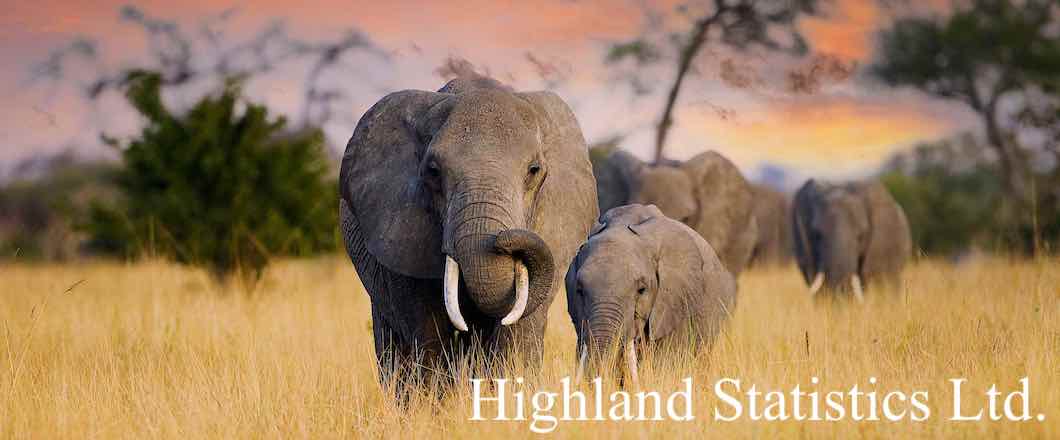Statistical consultancy
A few key questions:
- Do you need statistical guidance during your PhD?
- Have you submitted a paper and the statistical analysis was criticized?
- Have you sampled data and would like to know how to analyze the data?
- Do you need a statistician on board to win a project proposal?
- Do you want to carry out an experiment but have no idea how many samples to take?
Statistical techniques are required in nearly every stage of scientific research; from project proposal writing, experimental design, and data analysis, right up to report writing. One option is to do all the statistical work yourself. If you have the time and knowledge, we advise you to do so. However, your statistical skills may be rusty, or you may need statistical expertise for a particular problem. The learning curve to access the required statistical knowledge may be steep, time-consuming, and costly.
An alternative is to outsource the statistical work. At Highland Statistics Ltd we specialize in a wide range of statistical methods and applications (from bees to birds, copepods to whales, from plants on mountains to salt marsh plants, fish farming, public health data, medical data, social-economical data, stomach content data of dolphins, sea surface temperature time series, tagged seal data, etc.).
Examples of consultancy projects
- Analysis of beluga whales for DFO, Canada.
- Analysis of falcon data for a Canadian company.
- Spatial-temporal analysis of bird data for JNCC, UK.
- Analysis of spatial-temporal elephant mortality data using R-INLA for the United Nations.
- Analysis of zero-inflated spatial-temporal wind farm data using R-INLA for the Dutch government.
- Analysis of spatial-temporal fisheries data for a Norwegian government organization.
- Analysis of spatial-temporal marine benthic data for a Dutch company.
- A large number of PhD students from all over the world requested statistical guidance. Various examples:
- Statistical analysis of rodent species data using zero-inflated models for 2-way nested data.
- Statistical input on a biomedical project for an American PhD student. The project required mixed-effects modeling.
- Statistical analysis of penguin data.
- Statistical analysis of seeds data from plants with respect to regeneration after bush fires.
- Time series analysis of mortality in humans due to extreme weather conditions.
- Analysis of monkfish data for the Institute of Aquaculture, University of Stirling, UK.
- Spatial mapping of sea bird distributions (using Poisson Kriging) based on 20 years of data for JNCC.
- Time series analysis of phytoplankton data for RIKZ, The Netherlands.
- Analysis of hen harriers and wind farms for Natural Research, Banchory, UK.
- Power analysis and statistical support for a cod welfare data for Johnson Seafarms Ltd, Shetland, UK. See abstract.
- Analysis of fisheries data for the Marine Institute, Galway, Ireland.
- Statistical consultancy for a bio-diversity project, National University of Ireland, Galway, Ireland.
- Analysis of whale data for the University of Aberdeen; Resulting paper in the news!
- More whale data analysis for Aberdeen university; see the resulting paper.
- Provision of a statistical protocol for the analysis of whale data for the EU EnviEFH project.
- Statistical consultancy for the BAGPIPES project (bio-diversity), Oceanlab, University of Aberdeen, in co-operation with the University of York and the St. Andrews University.
- Statistical consultancy for two NERC projects, Oceanlab, University of Aberdeen.
- The University of Aberdeen purchased 30 days statistical consultancy in 2005. Results: approximately 10 co-authored papers and intensive guidance of various PhDs.
- Stats input for a project on birds, Department of Zoology, Ecology & Plant Science, University College Cork, Ireland.
- The University of Cork asked us to help with the statistical analysis of tagged animals.
- Application of multivariate analysis on morphometric, chemical, parasite and genetics data from herring (EU project) for FRS Marine Laboratory in Aberdeen.
- The Central Science Laboratory in York involved us in a bird radar project.
- The Crown Estate (UK) asked us to carry out an experimental design for sampling chemical variables in salmon at fish farms in Scotland.
- Based on a pilot study, a Dutch government institute asked us to set up a marine benthic monitoring program. Results were presented in a non-technical report: Development of an optimal marine benthic monitoring program with respect to species-environmental relations and temporal changes. The proposed monitoring program was implemented in June and July 2002, and the data were analyzed by Highland Statistics.
- The Environment Agency (UK) commissioned us to analyze the effects of nourishment on marine benthic data.
- During 2002-2005, we provided statistical consultancy for the EU funded project: Cephalopod Stocks in European Waters: Review, Assessment and Sustainable Management. Additionally, multivariate time series techniques were applied to estimate common spatial and temporal patterns in cephalopod abundances, and identify effects of external environmental factors, underlying stock dynamics and fishing pressure. This project has resulted in 4 co-authored papers.
- We were asked by the Marine Institute in Ireland to provide statistical guidance for a PhD-studentship dealing with Irish fisheries discarding. This project has resulted in 3 co-authored papers.
- We have carried out an extensive multivariate data analysis for Landcatch Ltd., a salmon smolts company in Scotland. Possible factors of post-transfer mortality of sea winter salmon in Scottish marine farms were identified.
